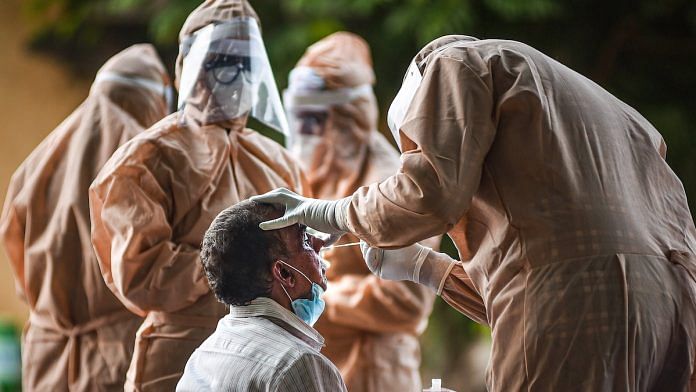State governments in India have struggled to uphold their constitutional responsibility of public health management due to budgetary, institutional and capacity constraints. The Covid-19 outbreak has revealed how over-dependent states are on the central government for technical expertise and financial support. In the past, outbreaks, such as Monkey Fever in Karnataka or Japanese Encephalitis in Uttar Pradesh and Bihar, not only exposed the shortcomings in the institutional framework for public health management at the state level, but also the lack of technical strength available with state governments to respond to such outbreaks.
Despite public health being a state subject, the central government is the key actor in designing health policies and programmes. This has largely been due greater spending ability and availability of better technical resources. For instance, to advise the Ministry of Health and Family Welfare, the government is assisted by the National Centre for Disease Control, National Health System Resources Centre and the Indian Council for Medical Research (ICMR).
Unfortunately, the state governments have been unable to invest in such agencies and benefit from their advice, leaving them to rely on the Centre’s aid and advice not only for nationwide pandemics, but local public health matters as well.
Also read: Divided by a virus — why the pandemic makes it look like nobody is in control in India
Centralised public health systems
The ICMR, India’s dedicated biomedical research body, has assisting states and the central government by providing quality technical advice to address public health emergencies including Covid-19. While the response to pandemics such as Covid-19 may be undertaken through common technical advice from ICMR, it becomes challenging to address state-specific public health crises through a top-down approach. But the way ICMR is structured disallows any suggestions or participation from states. On closer look, the composition of ICMR shows that there is limited scope for regional priorities of state government’s to receive the focus they deserve. The ICMR board is headed by the Union health minister, but has no representation from the states. ICMR’s research mandates are also aligned with national health objectives — states have limited or no say in the determination of its agenda. Canada’s premier public health technical body, Canadian Institutes of Health Research, is set up under its Act of Parliament. The Act specifically requires the body to consult, collaborate and form partnerships with provinces. The Canadian Act also recognises that public health research must be unique to each province, much unlike the top-down system in India.
A centralised public health research institution’s functioning has consequences on the last mile delivery system of a country’s health services. A World Bank report titled ‘India’s Public Health System: How Well Does it Function at the National Level’ observed that “implementation of the research findings of central agencies had become a challenge due to the lack of technical capacity at sub-national levels”. This indicated that the benefits of health research are not effectively reaching those responsible for planning and implementation.
States require specific and localised technical advice to design public health regulations for its residents. Better technical capacity will allow municipalities and lower governments bodies to efficiently manage factors impacting public health, such as sanitation and water supply. Currently, states only have a Directorate of Health Services, which in most states has become a coordination forum for health-related recruitment and lacks the technical capacity to provide required scientific advice. The lack of frameworks for ability of state governments to seek expert advice is evident from the multiple states compelled to set up Covid-19 technical task forces composed of expert doctors who act as advisers. To strengthen the capacities of states in the long run, ad-hoc task forces may not be an appropriate way forward.
Also read: Price controls are a terrible idea to tackle private-public healthcare gap in India
Need for state-level advisory bodies
There have been efforts to address concerns surrounding the centralisation of public health research — the National Health Research Policy, 2011 recommended partnering with state governments to improve local public health capacity by setting up a framework for scientific research. In continuation of the 2011 policy, the National Health Mission 2012-17 proposed establishing a State Health Systems Resource Centre (SHRCH) to provide technical assistance at the state level. This is a step in the right direction, but it only addresses a part of the concern. SHSRC, in its design, is required to provide technical assistance for efficient implementation of national public health objectives, but does not allow state governments to make references for assistance on local health issues.
Therefore, there is an urgent need for a dedicated technical advisory body at the state level which can periodically advise or give recommendations to state governments, and directly issue instructions for implementation. Such a technical set up has been found, to a certain extent, under the town planning law of Karnataka and many other states.
Section four of the Karnataka Town and Country Planning Act, 1961 established a State Town and Country Planning Board, and recognises it as the principal technical adviser to the state government with a mandate to periodically advise it on technical aspects of planning a city. Similarly, states would benefit by setting up a Public Health Board that is empowered to provide technical advice to various stakeholders within the state government, and can enable better preparation to independently manage local public health emergencies.
The author is a Resident Fellow at the Vidhi Centre for Legal Policy. Views are personal.
Also read: Early data from alternative medicine trials shows promising results against Covid: AYUSH secy



